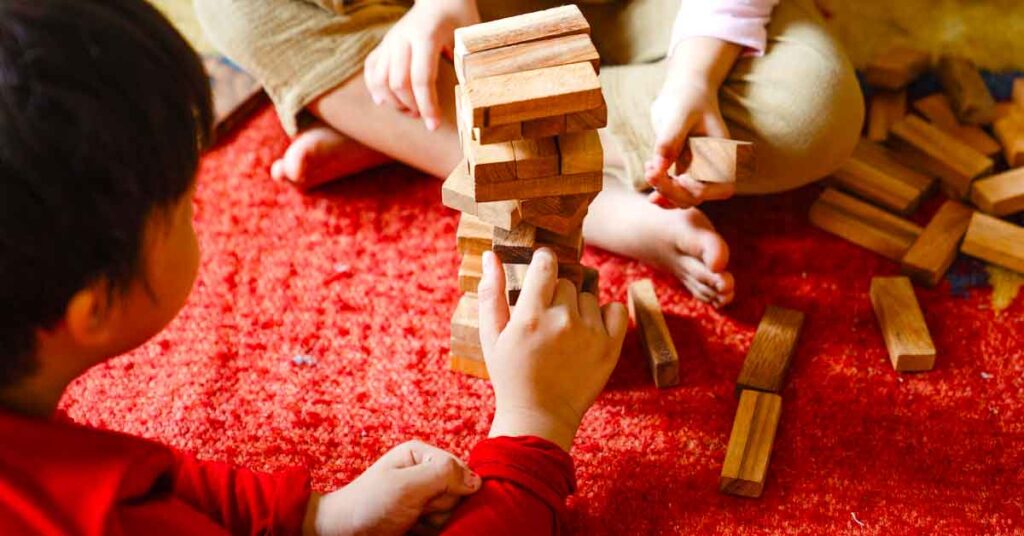Based on the works of Diana Baumrind, a developmental psychologist, and Stanford researchers Eleanor Maccoby and John Martin, child experts have identified four main types of parenting styles. They are
- Authoritarian parenting
- Authoritative parenting
- Permissive parenting
- Uninvolved parenting

Most parents tend to adopt different parenting styles based on the situation. However, a parent can be classified as a proponent of a particular parenting style if they tend to use that style predominantly.
Authoritarian Parenting Style
This parenting style is characterized by strict rules and high demands with little warmth or responsiveness. Authoritarian parents use punishment and control to enforce rules and often do not allow their children to express themselves or make their own decisions.
Common Features of Authoritarian Style
The common features of an authoritarian parenting style include:
- High levels of control: Authoritarian parents have strict rules and expect their children to follow them without question.
- Low warmth: Authoritarian parents are often distant and unresponsive to their children’s emotional needs.
- Punitive discipline: Authoritarian parents use punishment to enforce rules, rather than explaining why certain behaviors are unacceptable.
- Little freedom: Authoritarian parents give their children little autonomy or independence, making most decisions for them.
- High expectations: Authoritarian parents often have high expectations for their children’s behavior and academic performance.
- Focus on obedience: Authoritarian parents place a strong emphasis on obedience and respect for authority.

Attitude of Authoritarian Parents
Authoritarian parents are proponents of strict discipline and they expect their children to obey them without any question. Failure to follow their rules often results in harsh of unfair punishments.
Here are some examples of the attitudes of authoritarian parents:
- “I expect you to obey me without question.”
- “I don’t want to hear any excuses. Just do what I say.”
- “You will do things my way or suffer the consequences.”
- “I am the boss in this house, and you will respect my authority.”
- “You must meet my expectations for behavior and performance.”
- “I don’t care how you feel about it. This is how it’s going to be.”
- “I’m doing this for your own good, whether you like it or not.”
- “You need to learn to be more disciplined and obedient.”
- “You don’t get to make the rules. That’s my job.”
- “I know what’s best for you, so don’t argue with me.”
Effects of Authoritarian Style on Children
The effects of authoritarian parenting style on children can include:
- Low self-esteem: Children of authoritarian parents may struggle with low self-esteem because they are not allowed to make their own decisions or express themselves freely.
- Anxiety and depression: Children of authoritarian parents may be more likely to experience anxiety and depression due to the strict rules and punishments.
- Lack of social skills: Authoritarian parents often do not allow their children to socialize with others freely, leading to a lack of social skills.
- Difficulty making decisions: Children of authoritarian parents may struggle to make decisions on their own because they are not allowed to do so.
- Rebellion: Some children of authoritarian parents may rebel against the strict rules and expectations imposed upon them.
- Poor academic performance: While some children of authoritarian parents may excel academically due to high expectations, others may struggle because they do not have the autonomy to learn in a way that suits them.
- Aggression: Children of authoritarian parents may be more likely to display aggressive behavior because they are not taught how to express themselves in a healthy way.
Authoritative Parenting Style
This parenting style is characterized by a high level of warmth and responsiveness combined with clear rules and boundaries. Authoritative parents provide guidance and support while also allowing their children to make their own decisions.
Common Features of Authoritative Style
The common features of an authoritative parenting style include:
- High levels of warmth: Authoritative parents are responsive and nurturing, creating a supportive environment for their children.
- Reasonable demands: Authoritative parents set reasonable expectations for their children’s behavior and performance while also allowing them to make their own choices.
- Clear communication: Authoritative parents communicate clearly and openly with their children, explaining why certain behaviors are acceptable and others are not.
- Consistent discipline: Authoritative parents use positive reinforcement and consistent consequences to enforce rules.
- Encouragement of independence: Authoritative parents encourage their children to develop independence and autonomy.
- High expectations: Authoritative parents have high expectations for their children’s behavior and academic performance, but also provide support and guidance to help them reach their goals.
- Focus on mutual respect: Authoritative parents focus on building a relationship of mutual respect and trust with their children.

Attitude of Authoritative Parents
Though authoritative parents establish rules and guidelines for their children to follow, they take their children’s opinions and feelings into account. They also explain the reasons behind their rules. Their attitudes are more of nurturing and forgiving than punishing.
Here are some examples of the attitudes of authoritative parents:
- “I’m here to support you and help you grow.”
- “Let’s work together to find a solution that works for everyone.”
- “I understand that you’re upset, and I want to listen to what you have to say.”
- “We have rules in our family, but we can talk about why they’re important.”
- “I believe in you, and I know you can do this.”
- “I want you to feel comfortable making your own decisions.”
- “We may not always agree, but I respect your opinion.”
- “I trust you to make good choices.”
- “I’m proud of you for trying your best.”
- “Let’s celebrate your accomplishments and find ways to improve together.”
Effects of Authoritative Style on Children
The effects of authoritative parenting style on children can include:
- High self-esteem: Children of authoritative parents often have high self-esteem because they feel supported and valued.
- Positive social skills: Authoritative parents encourage their children to interact with others in a positive and respectful manner, leading to strong social skills.
- Independence and autonomy: Children of authoritative parents are encouraged to make their own decisions and develop independence and autonomy.
- Good academic performance: Authoritative parents often have high expectations for their children’s academic performance and provide support and guidance to help them succeed.
- Good mental health: Children of authoritative parents are less likely to experience anxiety, depression, or other mental health issues due to the positive and supportive environment they grow up in.
- Good behavior: Authoritative parents use positive reinforcement and consistent consequences to enforce rules, leading to good behavior.
- Strong problem-solving skills: Children of authoritative parents learn to problem-solve effectively due to the collaborative and supportive environment created by their parents.
Permissive Parenting Style
This parenting style is characterized by a high level of warmth and responsiveness combined with few rules or boundaries. Permissive parents may avoid disciplining their children and often allow them to make their own decisions without guidance.
Common Features of Permissive Style
The common features of a permissive parenting style include:
- Low demands: Permissive parents do not set many rules or expectations for their children.
- High responsiveness: Permissive parents are highly responsive to their children’s needs and desires.
- Little discipline: Permissive parents rarely discipline their children, often letting them make their own decisions.
- Lenient attitude: Permissive parents have a lenient attitude towards their children’s behavior and often excuse or overlook negative behaviors.
- Low control: Permissive parents do not exercise a high level of control over their children’s behavior.
- Indulgent approach: Permissive parents often indulge their children with toys, treats, and other rewards.
- Friend-like relationship: Permissive parents often strive to be friends with their children, rather than authority figures.

Attitude of Permissive Parents
Permissive parents prefer to avoid conflict with their children. They do not like to say ‘no’ or disappoint them. They concede to the demands of their children at the first sign of pressure.
Here are some examples of the attitudes of permissive parents:
- “I don’t want to upset my child, so I’ll let them do whatever they want.”
- “I want my child to like me, so I won’t set any rules or boundaries.”
- “I don’t want to be seen as strict or controlling, so I’ll avoid discipline altogether.”
- “My child knows what’s best for them, so I won’t interfere with their decisions.”
- “I want my child to be happy all the time, so I’ll give them whatever they want.”
- “I don’t want to deal with conflict, so I’ll avoid setting expectations or enforcing consequences.”
- “My child can handle things on their own, so I don’t need to be involved.”
- “I don’t want to push my child too hard, so I won’t set any goals or expectations.”
- “I don’t want to limit my child’s creativity, so I won’t impose any rules or structure.”
- “I don’t want my child to feel bad about themselves, so I won’t criticize or correct them.”
Effects of Permissive Style on Children
The effects of permissive parenting style on children can include:
- Lack of self-discipline: Children of permissive parents may struggle with self-discipline because they are not accustomed to rules and structure.
- Poor impulse control: Without clear boundaries and guidance, children of permissive parents may struggle with impulsivity and lack of self-control.
- Low academic achievement: Permissive parents often do not place a high value on academic achievement or provide the support necessary for children to succeed in school.
- Lack of respect for authority: Children of permissive parents may not develop a healthy respect for authority figures, which can lead to challenges in relationships and in school.
- Poor social skills: Permissive parents often do not provide enough structure or guidance for children to learn how to interact positively with others.
- Low self-esteem: Children of permissive parents may struggle with low self-esteem because they may not have a clear sense of boundaries or expectations.
- Emotional and behavioral issues: Without clear boundaries and guidance, children of permissive parents may struggle with emotional and behavioral issues such as anxiety, depression, and aggression.
Uninvolved Parenting Style
This parenting style is characterized by low levels of both warmth and responsiveness combined with few rules or boundaries. Uninvolved parents may neglect their children’s needs and often provide little emotional support or guidance.
Common Features of Uninvolved Style
The common features of an uninvolved parenting style are:
- Low responsiveness: Uninvolved parents do not provide enough emotional support or attention to their children.
- Low demands: Uninvolved parents do not set expectations for their children’s behavior or performance, and they do not provide guidance or structure.
- Lack of communication: Uninvolved parents often do not communicate with their children, and they may not be aware of what is going on in their child’s life.
- Lack of involvement: Uninvolved parents do not participate in their child’s activities, such as school events or extracurricular activities.
- Lack of supervision: Uninvolved parents do not monitor their child’s behavior or whereabouts, which can put the child at risk for negative outcomes.
- Neglectful: Uninvolved parents may neglect their child’s basic needs, such as food, shelter, and medical care.

Attitude of Uninvolved Parents
Neglectful parents are uninvolved in the lives of their children. Often they reject or neglect the needs of their children. Sometimes their indifference may not be intentional and might be due to lack of knowledge or they might be struggling with their own issues.
Here are some examples of the attitudes of uninvolved parents:
- “I have my own life to worry about, so I don’t have time for my child.”
- “My child is old enough to take care of themselves, so I don’t need to be involved.”
- “I don’t really know how to parent, so I’ll just stay out of it.”
- “My child can do whatever they want, it’s not my problem.”
- “I don’t really care what my child does, as long as they don’t bother me.”
- “My child’s problems are not my concern, they can deal with them on their own.”
- “I don’t want to be bothered by my child’s emotions, so I’ll avoid them altogether.”
- “I don’t want to be responsible for my child’s upbringing, so I’ll let them figure it out.”
- “I don’t want to interfere with my child’s life, so I’ll let them do whatever they want.”
- “I don’t want to deal with the stress of parenting, so I’ll avoid it as much as possible.”
Effects of Uninvolved Style on Children
The effects of an uninvolved parenting style on children can be severe and long-lasting. Some of the common effects include:
- Emotional issues: Children of uninvolved parents may struggle with emotional issues such as anxiety, depression, and low self-esteem due to a lack of emotional support and validation.
- Behavioral problems: Children of uninvolved parents may exhibit behavioral problems such as aggression, delinquency, and substance abuse due to a lack of guidance and structure.
- Academic issues: Children of uninvolved parents may struggle academically due to a lack of support and motivation.
- Social issues: Children of uninvolved parents may struggle with social issues such as isolation, peer rejection, and difficulty forming healthy relationships due to a lack of socialization and modeling of healthy relationships.
- Developmental delays: Children of uninvolved parents may experience developmental delays due to a lack of stimulation, support, and guidance.
- Risky behaviors: Children of uninvolved parents may engage in risky behaviors such as early sexual activity, substance abuse, and delinquent behavior due to a lack of supervision and guidance.






